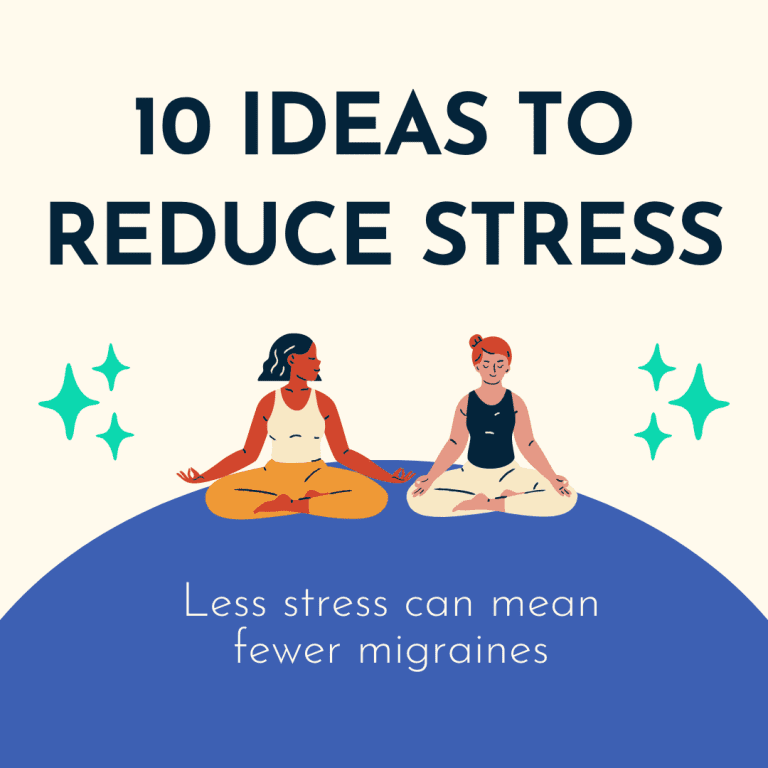Migraines and Stress – 10 Ideas to Reduce Stress
Here are a few strategies people in our community tracked and found helpful for combating stress.

Finding ways to reduce the big up and down swings of stress may help reduce the number and severity of your migraines.
As with most migraine triggers, stress seems to play a different role for different people. For a lot of us, stressful days can be a major migraine trigger. For some of us, stress isn’t a factor.
Did you know that some people also get more migraines the day after a highly stressful day? Research hasn’t unraveled why that is, yet.
A lot of people try to even things out with a practice of regular stress reduction techniques. Even on days that aren’t particularly stressful, you can work on reducing your body’s overall response to stress. Finding time every day or even a few times a week to actively work on soothing your parasympathetic system could be a good strategy to help get migraines under control.
Here’s 10 ideas on how to reduce stress –
1. The ‘Pause’
Try this – just simply give yourself a break. Getting in the habit of this a few times a day can do wonders for helping to cope with stress overall.
How? With this strategy, you stay where you are. And, just … pause. Maybe it’s just a few breaths. Or, a short, 1-5 minute break. You decide. Taking even a few moments to turn away from focusing on the source of your work or stress can do wonders in helping you clear your head and refocus. Psychology Today outlines this technique on their site.
2. Change Your Scenery
Step outside for some fresh air or take a short walk. Any activity that will help you distance yourself emotionally and physically can be beneficial in reducing stress.
3. Get Some Movement – Exercise
Regular physical exercise releases endorphins which act as natural mood boosters. This can help alleviate feelings of anxiety and depression associated with prolonged stress. It’s not just about situational stress. Regular exercise, even just 30 minutes of walking several times a week, can make a big difference in how your body responds to stressful situations overall.
4. Talk to Someone
Whether it be a friend, family member, or therapist, talking about what is causing you stress can help you gain perspective on the situation and come up with potential solutions. Talking to a therapist or mental health professional can also give you an opportunity to vent without fear of judgment or criticism.
5. Practice Mindfulness
Mindfulness is paying attention to the present moment without judgment or criticism; focusing on what’s happening right now instead of worrying about the past or future events that haven’t yet happened (and might never happen).
Practicing mindfulness encourages us to observe our thoughts, feelings, and bodily sensations without trying to change them or judge them as good or bad. This practice can help us become more aware of our automatic reactions when we feel stressed so we can begin to choose how we want to respond instead of reacting out of habit or instinct when faced with stressful situations.
Harvard Health Publishing has some good resources here – How can mindfulness practices help with migraine?
6. Get Enough Sleep
Lack of sleep has been linked with increased levels of stress hormones like cortisol. So, it’s important that we get enough restful sleep every day in order for our bodies and minds to stay healthy and balanced under pressure. 7-9 hours per night is recommended. Pay attention to this if you’re getting more or less. And, definitely consider talking to your care team about it. But, we recommend – don’t stress about it. Everyone is different.
If you get headaches or migraines that happen at night, ask your neurologist about this specific type of condition. The Mayo Clinic has a guide.
7. Practice Deep Breathing
Deep breathing exercises are commonly used as part of relaxation techniques such as yoga, meditation and tai chi. They work by activating the parasympathetic nervous system which helps slow down heart rate and respiration allowing us to feel calmer in the face of stressful situations or emotions like anger or frustration.
8. Make Time for Leisure
Make time for leisure activities such as reading books, watching movies/TV shows, listening music. Making time for these things allows us to take a break from reality for a little. This helps us recharge our batteries before going back into battle against whatever has been stressing us out lately
9. Find Humor in Everyday Life
Laughing has been found to have positive effects on mental health; it reduces cortisol levels (the hormone associated with stress) while at the same time increasing serotonin levels (the hormone associated with happiness). Furthermore, laughing triggers the release endorphins which act as natural mood boosters.
So, finding an opportunity each day where you can laugh even if it’s just at yourself can help lower your overall levels of anxiety/stress over time. If you have laughter-induced migraines, then we’re sorry. And, we know you know not to follow this suggestion.
10 . Set better goals – reduce, if needed
Setting unrealistic expectations often leads directly into frustration when those expectations are not met; try setting achievable goals instead that focus on progress rather than perfectionism.
Conclusion: Stress is inevitable but manageable if we know what steps we need to take in order minimize its effect on our lives; follow these 10 strategies regularly and you’ll find yourself feeling less overwhelmed by life’s challenges.
11. BONUS – Find a song, or many!
Music can help us destress. It could be a song you like or a playlist you like. There is specific music developed to help you reduce stress. Migraine Again has a guide for Audio Therapy for Migraine. Some of our users have tracked daily music sessions and found a general reduction in stress when regularly listening to soothing music. This could be similar to the effect of daily meditation for some people.
So, don’t let stress get you down—take action today. Try implementing these strategies into your daily routine and enjoy living life again without having worries drag you down.



